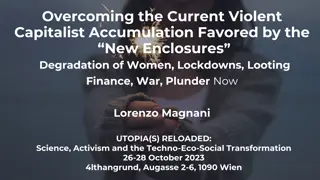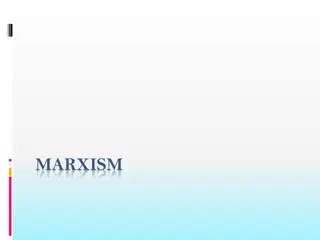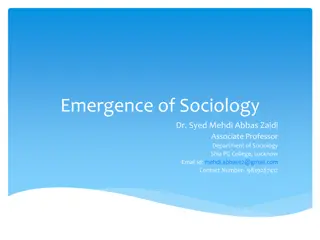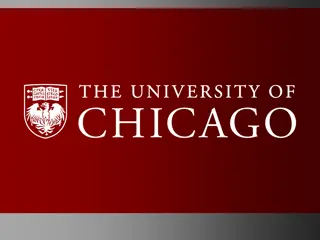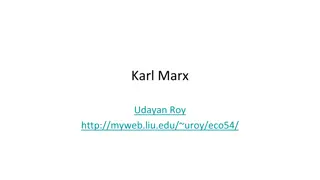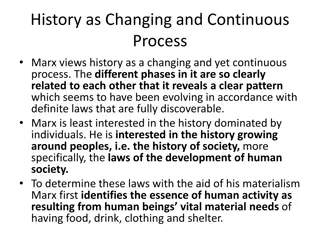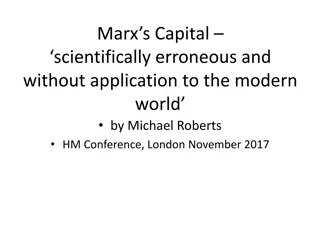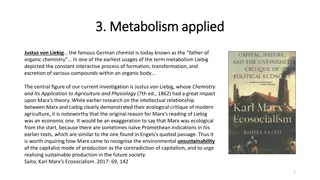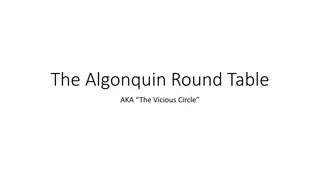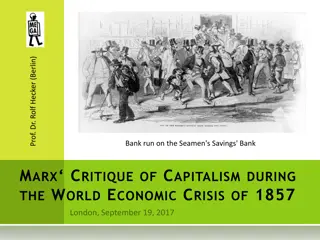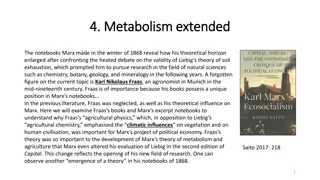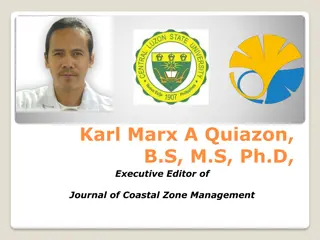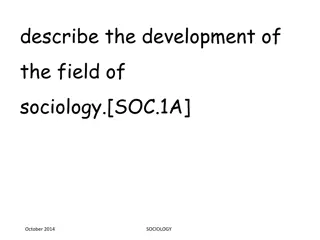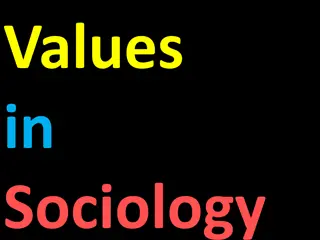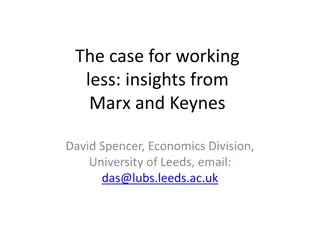
Understanding the Economic Structure of Society
Explore the concept that the economic structure of society, formed by relations of production, influences legal, political, and social systems, shaping individuals' consciousness and societal development. Dive into the idea that the base determines the superstructure, as discussed by Marx, Althusser, and others, and learn about the ideological State apparatuses and their role in shaping societal norms and values.
Download Presentation

Please find below an Image/Link to download the presentation.
The content on the website is provided AS IS for your information and personal use only. It may not be sold, licensed, or shared on other websites without obtaining consent from the author. If you encounter any issues during the download, it is possible that the publisher has removed the file from their server.
You are allowed to download the files provided on this website for personal or commercial use, subject to the condition that they are used lawfully. All files are the property of their respective owners.
The content on the website is provided AS IS for your information and personal use only. It may not be sold, licensed, or shared on other websites without obtaining consent from the author.
E N D
Presentation Transcript
In the social production of their existence, men inevitably enter into definite relations, which are independent of their will, namely relations of production appropriate to a given stage in the development of their material forces of production. The totality of these relations of production constitutes the economic structure of society, the real foundation, on which arises a legal and political superstructure and to which correspond definite forms of social consciousness. The mode of production of material life conditions the general process of social, political and intellectual life. It is not the consciousness of men that determines their existence, but their social existence that determines their consciousness. Marx, Preface to A Contribution to the Critique of Political Economy (1859)
The totality of these relations of production constitutes the economic structure of society, the real foundation, on which arises a legal and political superstructure and to which correspond definite forms of social consciousness. The mode of production of material life conditions the general process of social, political and intellectual life. Marx, Preface to A Contribution to the Critique of Political Economy (1859) The handmill gives you society with the feudal lord; the steam mill, society with the industrial capitalist. Marx, The Poverty of Philosophy (1847)
What does it mean, base determines superstructure? Base should determine superstructure vulgar Marxism, Soviet realism (http://www.umsl.edu/~gradyf/theory/doones1.htm) Base is reflected in superstructure Luk cs & totality (praise of 19th c. Realist novels) Base s contradictions are exposed in superstructure Frankfurt School; Brecht; Benjamin (praise of Modernist texts)
Althusser, from Ideology and Ideological State Apparatuses What are the ideological State apparatuses (ISAs)? They must not be confused with the (repressive) State Apparatus. Remember that in Marxist theory, the State Apparatus (SA) contains: the Government, the Administration, the Army, the Police, the Courts, the Prisons, etc., which constitute what I shall in future call the Repressive State Apparatus. Repressive suggests that the State Apparatus in question 'functions by violence'--at least ultimately (since repression, e.g. administrative repression, may take non- physical forms). The Repressive State Apparatus in action: http://www.youtube.com/watch?v=GpwYGp4a0cQ&feature=related (2011) http://www.youtube.com/watch?v=6yXvQE9WJEY&feature=related (1968)
Althusser, from Ideology and Ideological State Apparatuses I shall call Ideological State Apparatuses a certain number of realities which present themselves to the immediate observer in the form of distinct and specialized institutions. I propose an empirical list of these which will obviously have to be examined in detail, tested, corrected and reorganized. With all the reservations implied by this requirement, we can for the moment regard the following institutions as Ideological State Apparatuses (the order in which I have listed them has no particular significance): -the religious ISA (the system of the different Churches), -the educational ISA (the system of the different public and private 'Schools') , -the family ISA, -the legal ISA, -the political ISA (the political system, including the different Parties), -the trade-union ISA, -the communications ISA (press, radio and television, etc.), -the cultural ISA (Literature, the Arts, sports, etc.).
Some contradictions ripe for symbolic resolution in narrative:
What problem does the New Historicism seek to solve? The problem of History Some schools bracket it (structuralism, psychoanalysis, formalism, deconstruction) Some claim to stand outside well, one: Marxism Some claim to understand it perfectly well ( old historicism ) http://winmedia.umsl.edu/gradyf/cathedral1.wmv
In confronting the issue and following Frederic Jamesons dictumAlways historicize! it faces the problem of identity / difference: "If we choose to affirm the identity of the alien object with ourselves--if, in other words, we decide that Chaucer, say, or... the narratives of nineteenth-century Russian gentry are more or less directly or intuitively accessible to us with our own cultural moyens du bord--then we have presupposed in advance what was to have been demonstrated, and our apparent 'comprehension' of these alien texts must be haunted by the nagging suspicion that we have all the while remained locked on our own present ... that we have never really left home at all ... Yet, if as a result of such hyperbolic doubt, we decide to reverse this initial stance, and to affirm, instead and from the outset, the radical Difference of the alien object from ourselves, then at once the doors of comprehension begin to swing closed and we find ourselves separated by the whole density of our own culture from objects or cultures thus initially defined as Other from ourselves and thus as irremediably inaccessible."
How does it attempt to solve this problem? A return to local, contingent, localized, contested histories: Freed from static "world pictures," and faced with the opportunity to approach literary texts as agents as well as effects of cultural change, as participating in a cultural conversation rather than merely representing the conclusion reached in that conversation, as if it could have reached no other--at least partially freed from these tired habits and the collapsed assumptions on which they rested, we ought to be able to produce a criticism that would at least make significant strides toward understanding "language in history: that full field." Carolyn Porter, "Are We Being Historical Yet?" (1990) A methodological self-consciousness and openness to self-examination (some would say, too much)
Elements contributing to New Historicist practice: Althusserian notions of ideology and subject formation Foucault and discourse theory; how power works and creates subject-positions Geertz s cultural anthropology interested in the symbolic functions of material practice, captured through thick description, snapshots of culture (n.b. thus a synchronic bias in its explanations) The poststructuralist critique of representation, i.e., the deconstructive critique of language as a deferral of meaning, as a chain of signifiers, as productive of indeterminacy Hayden White s account of the historical text as literary artifact ; cp. Montrose s chiasmus: the historicity of texts, the textuality of history. A departure, it is claimed, from an old historicism A methodological self-consciousness about the critic s own historical situation and biases
Elements contributing to New Historicist practice: Althusserian notions of ideology and subject formation Foucault and discourse theory; how power works and creates subject-positions These collective social constructions on the one hand define the range of aesthetic possibilities within a given representational mode and, on the other, link that mode to the complex network of institutions, practices , and beliefs that constitute the culture as a whole. ( Power of Forms, 1445b) Geertz s cultural anthropology interested in the symbolic functions of material practice, captured through thick description, snapshots of culture (n.b. thus a synchronic bias in its explanations) The poststructuralist critique of representation, i.e., the deconstructive critique of language as a deferral of meaning, as a chain of signifiers, as productive of indeterminacy Hayden White s account of the historical text as literary artifact ; cp. Montrose s chiasmus: the historicity of texts, the textuality of history. A departure, it is claimed, from an old historicism A methodological self-consciousness about the critic s own historical situation and biases
Elements contributing to New Historicist practice: Althusserian notions of ideology and subject formation Foucault and discourse theory; how power works and creates subject-positions Geertz s cultural anthropology interested in the symbolic functions of material practice, captured through thick description, snapshots of culture (n.b. thus a synchronic bias in its explanations) The critical practice challenges the assumptions that guarantee a secure distinction between literary foreground and political background, or, more generally, between artistic production and other kinds of social production. (1445b) The poststructuralist critique of representation, i.e., the deconstructive critique of language as a deferral of meaning, as a chain of signifiers, as productive of indeterminacy Hayden White s account of the historical text as literary artifact ; cp. Montrose s chiasmus: the historicity of texts, the textuality of history. A departure, it is claimed, from an old historicism A methodological self-consciousness about the critic s own historical situation and biases
Elements contributing to New Historicist practice: Althusserian notions of ideology and subject formation Foucault and discourse theory; how power works and creates subject-positions Geertz s cultural anthropology interested in the symbolic functions of material practice, captured through thick description, snapshots of culture (n.b. thus a synchronic bias in its explanations) The poststructuralist critique of representation, i.e., the deconstructive critique of language as a deferral of meaning, as a chain of signifiers, as productive of indeterminacy The new historicism erodes the firm ground of both criticism and literature. (144b) Hayden White s account of the historical text as literary artifact ; cp. Montrose s chiasmus: the historicity of texts, the textuality of history. A departure, it is claimed, from an old historicism A methodological self-consciousness about the critic s own historical situation and biases
Elements contributing to New Historicist practice: Althusserian notions of ideology and subject formation Foucault and discourse theory; how power works and creates subject-positions Geertz s cultural anthropology interested in the symbolic functions of material practice, captured through thick description, snapshots of culture (n.b. thus a synchronic bias in its explanations) The poststructuralist critique of representation, i.e., the deconstructive critique of language as a deferral of meaning, as a chain of signifiers, as productive of indeterminacy Hayden White s account of the historical text as literary artifact ; cp. Montrose s chiasmus: the historicity of texts, the textuality of history. A departure, it is claimed, from an old historicism The earlier historicism tends to be monological It is not thought to be the product of the historian s interpretation, nor even of the particular interests of a given social group in conflict with other groups. (1444b) A methodological self-consciousness about the critic s own historical situation and biases
Elements contributing to New Historicist practice: Althusserian notions of ideology and subject formation Foucault and discourse theory; how power works and creates subject-positions Geertz s cultural anthropology interested in the symbolic functions of material practice, captured through thick description, snapshots of culture (n.b. thus a synchronic bias in its explanations) The poststructuralist critique of representation, i.e., the deconstructive critique of language as a deferral of meaning, as a chain of signifiers, as productive of indeterminacy Hayden White s account of the historical text as literary artifact ; cp. Montrose s chiasmus: the historicity of texts, the textuality of history. A departure, it is claimed, from an old historicism A methodological self-consciousness about the critic s own historical situation and biases It tends to ask questions about its own methodological assumptions and those of others.. (1445b)
Critical responses to New Historicism It s not really that new. (Certainly medievalists tend to feel that way!)
Critical responses to New Historicism It s not really that new. (Certainly medievalists tend to feel that way!) It depends on a reductive use of Foucault s containment / subversion model (which may reductive to begin with)
Critical responses to New Historicism It s not really that new. (Certainly medievalists tend to feel that way!) It depends on a reductive use of Foucault s containment / subversion model (which may reductive to begin with) Marxist response: for all its rhetorical radicalism, it s quietist, antimaterialist, tends to ignore class (due to its synchronic bias), and overemphasizes the symbolic
Critical responses to New Historicism It s not really that new. (Certainly medievalists tend to feel that way!) It depends on a reductive use of Foucault s containment / subversion model (which may reductive to begin with) Marxist response: for all its rhetorical radicalism, it s quietist, antimaterialist, tends to ignore class (due to its synchronic bias), and overemphasizes the symbolic Feminist response: not only are women left out of the new history, but feminism is left out of the account of New Historicism s rise
Critical responses to New Historicism It s not really new. (Certainly medievalists tend to feel that way!) It depends on a reductive use of Foucault s containment / subversion model (which may reductive to begin with) Marxist response: for all its rhetorical radicalism, it s quietist, antimaterialist, tends to ignore class (due to its synchronic bias), and overemphasizes the symbolic Feminist response: not only are women left out of the new history, but feminism is left out of the account of New Historicism s rise Incoherency vis- -vis its historicist / poststructuralist synthesis asserting wall-to-wall textuality is inconsistent with making specific evidence-based arguments (Fish calls this situation hopeless but not serious)
Critical responses to New Historicism It s not really new. (Certainly medievalists tend to feel that way!) It depends on a reductive use of Foucault s containment / subversion model (which may reductive to begin with) Marxist response: for all its rhetorical radicalism, it s quietist, antimaterialist, tends to ignore class (due to its synchronic bias), and overemphasizes the symbolic Feminist response: not only are women left out of the new history, but feminism is left out of the account of New Historicism s rise Incoherency vis- -vis its historicist / poststructuralist synthesis asserting wall-to-wall textuality is inconsistent with making specific evidence-based arguments (Fish calls this situation hopeless but not serious) An annoyingly coy reluctance about what Raymond Williams would call incorporation

